Nestled in the historic city of Odawara, Japan, the traditional art of Yosegi coaster making offers visitors a captivating glimpse into the intricate world of Japanese marquetry. Skilled artisans guide participants through the meticulous process of selecting wood, cutting intricate patterns, and assembling their creations. What unfolds is a meditative journey that not only results in a stunning keepsake but also immerses individuals in the rich cultural heritage of this enduring craft.
Key Points
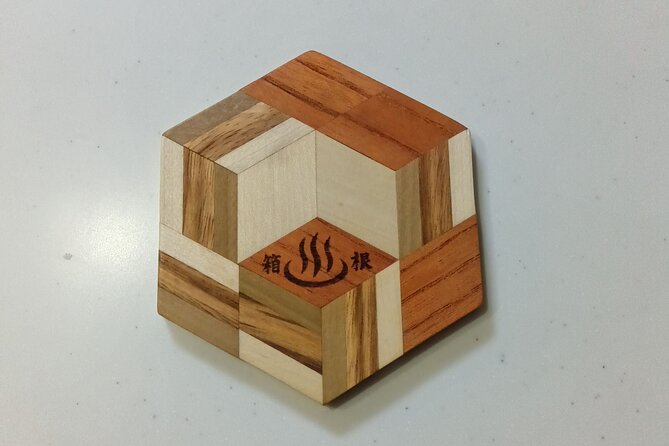
- Yosegi is a traditional Japanese marquetry technique used to create intricate coaster patterns during a guided workshop in Odawara, Japan.
- The workshop offers participants the opportunity to select wood species and colors to create their own unique coaster design.
- The coaster making process involves cutting thin strips of wood, gluing them together, and applying a protective finish to enhance the beauty.
- The activity is described as a meditative and rewarding experience, concluding with a visit to a nearby art museum showcasing Yosegi-inspired woodworking exhibits.
- The workshop is easily accessible from Iriuda Station, with a group size limited to a maximum of 5 travelers and a cost starting from $33.64 per person.
Activity Overview
The traditional Yosegi Coaster Making activity in Odawara, Japan, allows participants to create their own unique coaster using traditional techniques.
Participants will learn the intricate art of Yosegi, a traditional Japanese marquetry technique, to craft their own decorative coaster.
The activity takes place in Odawara, a city known for its rich cultural heritage and craftsmanship.
Participants will gather at the Iriuda Station and follow a guide with a blue backpack to the workshop, where they’ll enjoy the step-by-step process of creating their personalized Yosegi coaster.
The activity concludes back at the meeting point.
You can also read our reviews of more tours and experiences in Odawara.
Meeting Details
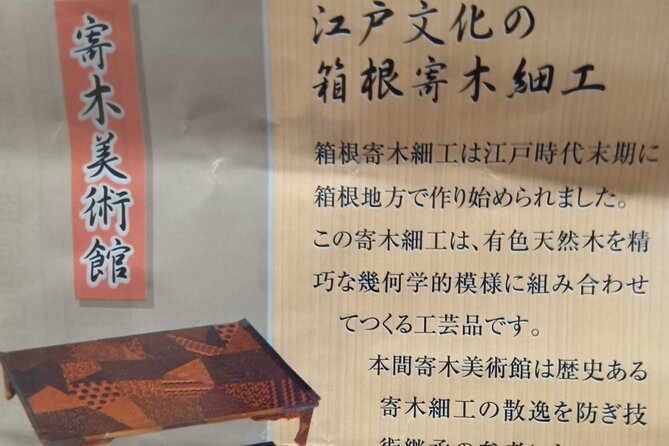
Participants will meet at Iriuda Station, located in Iryuda, Odawara, Kanagawa 250-0031, Japan.
Look for a blue backpack at the ticket gate. The activity ends back at the meeting point.
Getting to the location is easy, as nearby public transportation is available. Participants should plan to arrive on time, as the experience is scheduled to begin promptly.
The group size is limited to a maximum of 5 travelers per session, ensuring a personalized and engaging experience for all.
Pricing and Booking
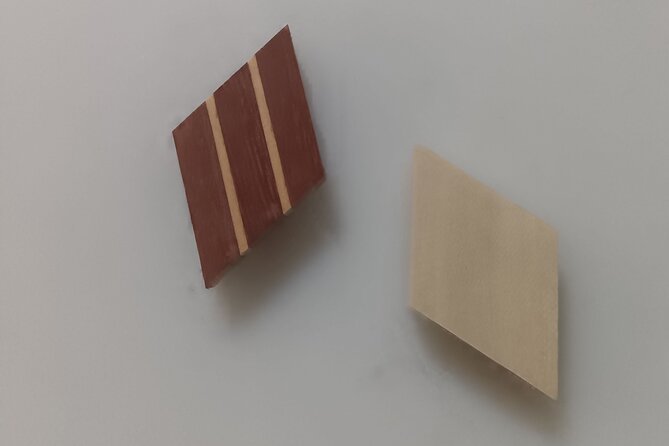
The cost for the traditional Yosegi coaster making experience starts from $33.64 per person.
Travelers have the flexibility to reserve now and pay later. Cancellation is free up to 24 hours before the activity starts.
The maximum group size is 5 travelers per session. While the experience isn’t wheelchair accessible, it’s stroller accessible. Infants must sit on laps, and children under 5 can participate for free without making a coaster.
Confirmation is received at the time of booking, and nearby public transportation is available.
The experience also includes a lunch meeting and art museum visit.
Accessibility and Participation
Although the traditional Yosegi coaster making experience is not wheelchair accessible, it is stroller accessible. Infants must sit on laps during the activity. Children under 5 years old can participate for free, but will not make a coaster. Most travelers can partake in this unique cultural experience.
| Accessibility | Yes | No |
|---|---|---|
| Wheelchair | X | |
| Stroller | X | |
| Infants | X | |
| Children Under 5 | X | |
| Most Travelers | X |
Yosegi Woodworking Tradition
Yosegi woodworking is a centuries-old Japanese craft that serves as the foundation for the traditional coaster-making experience. This intricate technique involves layering and cutting different colored woods to create mesmerizing patterns and designs.
Artisans meticulously hand-craft each Yosegi piece, requiring immense skill and patience. The diverse wood grains and hues, from maple to cherry, are skillfully combined to produce unique, one-of-a-kind coasters.
Participants will learn about this rich heritage and have the opportunity to create their own Yosegi coaster, taking home a tangible piece of Japanese culture. This activity offers a unique glimpse into a time-honored tradition.
Coaster Making Process
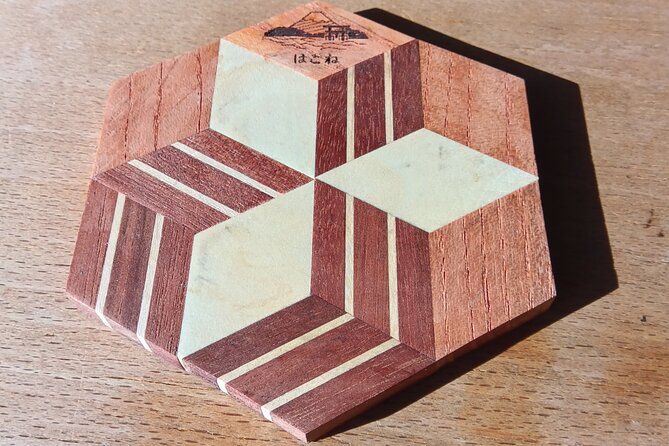
Participants begin the coaster-making process by selecting their preferred wood species and colors, which are the foundation of the Yosegi technique.
They then cut the wood into thin strips and arrange them in intricate patterns, creating a mosaic-like design. The instructor guides them through the process of gluing the strips together and smoothing the surface.
Finally, they apply a protective finish to the coaster, bringing out the natural beauty of the Yosegi woodwork.
The entire process is both meditative and rewarding, as participants create a unique and functional piece of art to take home.
Lunch and Art Museum Visit
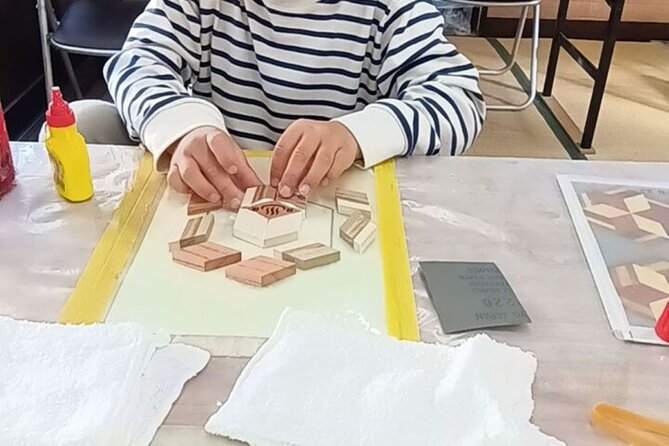
After the coaster-making session, participants enjoy a lunch at a local restaurant, featuring traditional Japanese cuisine. The menu includes:
| Dish | Description | Price |
|---|---|---|
| Miso Soup | A savory broth with tofu and seaweed | $4 |
| Teriyaki Chicken | Grilled chicken in a sweet soy-based sauce | $8 |
| Vegetable Tempura | Lightly fried seasonal vegetables | $6 |
| Green Tea | Brewed hot or cold tea | $3 |
Following the meal, the group visits a nearby art museum to explore Yosegi-inspired woodworking exhibits and learn about the cultural significance of this traditional craft.
Takeaways and Memories
The cherished souvenirs from this immersive cultural experience extend far beyond the handcrafted coaster.
Participants leave with a deeper appreciation for the Japanese art of Yosegi, a newfound connection to the local community, and a sense of personal accomplishment.
The memories forged during this activity include:
- The camaraderie of working alongside skilled artisans and fellow travelers
- The pride of creating a unique, functional piece of art
- The delight of discovering Odawara’s vibrant historical and artistic heritage
- The lasting impact of supporting traditional craftsmanship and sustainable tourism
Frequently Asked Questions
How Much Prior Experience Is Required to Participate?
No prior experience is required to participate. The activity is suitable for all skill levels, from beginners to experienced. Participants will learn the traditional techniques from the instructor during the session.
What Materials Are Provided for the Coaster Making?
Participants are provided with all the necessary materials to create their own coaster, including pre-cut wood pieces, traditional woodworking tools, and guidance from experienced artisans on the traditional Yosegi techniques.
Can Participants Take the Finished Coaster Home?
Participants can take the finished coaster home as a souvenir of their traditional Japanese craft-making experience. The coaster is theirs to keep after the session ends back at the meeting point.
Is Photography/Videography Allowed During the Activity?
Yes, participants are allowed to take photos and videos during the activity. The event description does not mention any restrictions on photography or videography, so participants can capture their coaster-making process and final product.
What Should Participants Bring or Wear for the Experience?
Participants should wear comfortable, casual clothing and closed-toe shoes. They don’t need to bring any special materials – the experience provides all necessary supplies for making the traditional Yosegi coasters.
Recap
Participants enjoy the intricate art of Yosegi marquetry, creating unique coasters that encapsulate the beauty and cultural significance of this traditional Japanese craft. The hands-on experience, guided by skilled artisans, offers a meditative and rewarding process, complemented by a taste of local cuisine and a visit to an art museum. Crafters leave with not just a beautiful handmade item, but a deeper appreciation for the time-honored traditions of Odawara.
More Tour Reviews in Odawara
- Odawara: Sushi Dinner and Karaoke Experience With Geisha
- Private Unforgatable Snorkeling Day Trip in Izu (Shizuoka)
- Odawara: Sushi Course Dinner and Karaoke Experience
- Odawara: Izakaya Dinner and Karaoke Lounge Experience
- Odawara: Zazen Meditation and Tea Ceremony With Lunch
- Odawara: Izakaya Dinner and Karaoke Experience With Geisha
Not for you? Here's more things to do in Odawara we have recnetly reviewed
- 2 Best Guided Tours In Odawara
- 3 Best Tours In Odawara
- 5 Best Dinner Tours In Odawara
- 6 Best Dining Experiences In Odawara
- Lacquer Polishing Create Unique Japanese Tableware
- Hakone Sightseeing Private Tour From Tokyo
- Odawara: Odawara Fish Market Experience
- Become a Lord of Odawara Castle Private Tour
- Japanese Traditional Music Experience in Odawara
- Traditional Yosegi Coaster Making
- 2 Best Historical Tours In Odawara
- 3 Best Drinking Tours In Odawara
